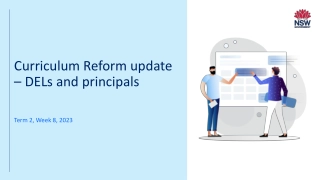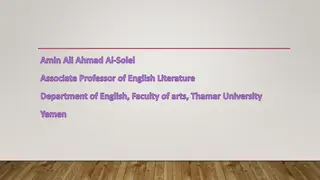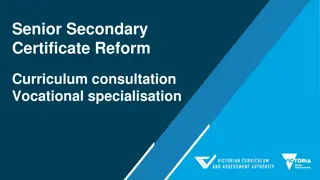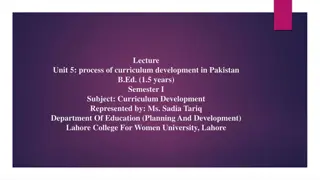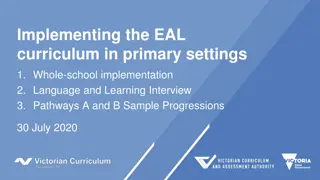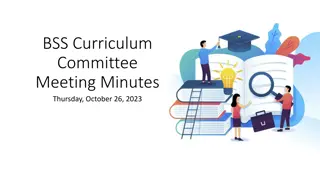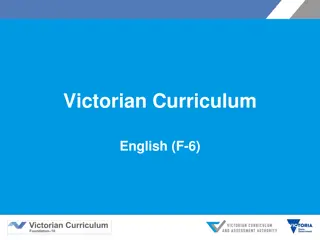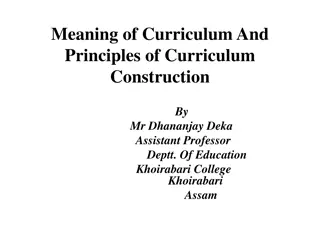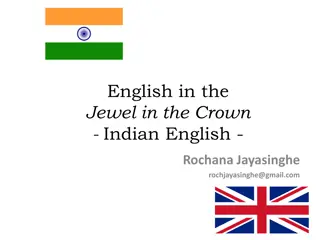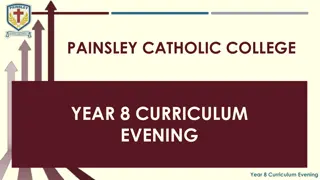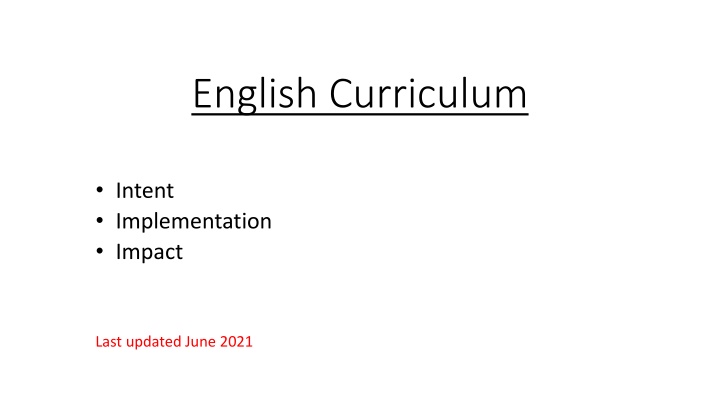
Building English Literacy Skills: Intent, Implementation, and Impact
Our English curriculum aims to build cumulative literacy skills, inspire a love for learning English, and promote independent functional literacy. Through a flexible and student-centered approach, students engage with diverse stories, develop creativity, and achieve qualifications. The implementation involves a sequential plan tailored to Deaf learners, diverse reading approaches, explicit vocabulary instruction, and creative writing opportunities. The impact is evident in improved reading fluency, writing progress, student engagement, and library usage.
Download Presentation

Please find below an Image/Link to download the presentation.
The content on the website is provided AS IS for your information and personal use only. It may not be sold, licensed, or shared on other websites without obtaining consent from the author. If you encounter any issues during the download, it is possible that the publisher has removed the file from their server.
You are allowed to download the files provided on this website for personal or commercial use, subject to the condition that they are used lawfully. All files are the property of their respective owners.
The content on the website is provided AS IS for your information and personal use only. It may not be sold, licensed, or shared on other websites without obtaining consent from the author.
E N D
Presentation Transcript
English Curriculum Intent Implementation Impact Last updated June 2021
Intent For learning to be cumulative and literacy skills to be built sequentially. To read fluently, regardless of preferred mode of communication. To write in English with accuracy, fluency and stamina. Inspire a love of learning English and a passion for reading - engage students using their own interests as a starting point. Give students skills for life and enable them to be independent through functional literacy (reading, writing, communicating). To meet individual needs a flexible, adaptable curriculum with the students at its heart. Give students access to a wide range of diverse stories and voices, both from our literary heritage and beyond. Increase students world knowledge and make links across the curriculum so that reading and writing is relevant and students can clearly see its purpose. Provide opportunities for creativity and expression as well as developing resilience, challenge and autonomy. For all students to achieve qualifications in English an aspirational curriculum for all.
Implementation English curriculum plan which builds skills sequentially, taking into account the specific needs of Deaf learners. A range of approaches to reading employed including: phonics instruction, sight learning strategies, BSL-written English translation (see flow chart). Explicit vocabulary instruction at the heart of all teaching, target vocabulary is pre-taught and regularly returned to. Reading scheme books used across key stages 1, 2, 3 (and 4 if appropriate) students read regularly to adults both in school and at home Visual support provided to support the needs of Deaf learners; a range of tools used including The SHAPECODING SYSTEM , Communicate in Print, Proloquo2go. Grammar skills taught explicitly and regularly returned to, e.g. through starter activities. Assessment cycle in which written work is modelled, drafted, feedback given, up-levelled and re-drafted so that students can polish and improve their writing. Books/texts chosen carefully and purposefully to engage the interests of student whilst also ensuring a rich and varied diet of texts. School library is available at break times for students to choose books to read for pleasure. Students can also request books to be ordered and added to the library. Wherever possible, stories and books are read aloud to students with BSL interpreting. Special events such as World Book Day celebrated to further engage students with reading Topic approach in primary so that reading and writing can be linked to other curriculum areas. Secondary teachers develop literacy skills through vocabulary instruction, reading opportunities and written work. Regular opportunities for producing their own creative written work their creative voices celebrated and shared through displays, school social media, entry into competitions. A range of qualifications available including GCSE, Step up to English Entry Level awards, Functional Skills and Unit Awards.
Impact/Evidence Students read with greater fluency and understanding increased scores on the York Assessment for Reading Comprehension (YARC), students moving up through the book bands, weekly reading comprehensions in their reading folders. Students produce written work on a regular basis, at least one piece per half term progress evident in their assessment files. This is assessed and moderated by English teachers to monitor progress and identify next steps. Student voice students enjoy English and are proud of their work. Students choose to go to the library at break times and borrow books (record of this in the library file). Many students choose to borrow books which have been discussed in English lessons. Primary classrooms are rich in cross curricular language (working walls, displays) and reading and writing is topic based e.g. writing instructions to make volcanoes. Lesson observations in other subject areas in secondary show a commitment to supporting literacy across the curriculum, e,g, explicit vocabulary instruction in Science, reading information texts in History. Book scrutinies demonstrate that the curriculum intent is being implemented and progress is evident in the books/assessment files. In the last two years, two students have achieved GCSE English language grade 3 (which was their predicted grade). Three students have achieved Entry Level 1 Functional Skills English in the last year and are currently studying for Entry Level 2. One student is studying for Functional Skills Level 1 English as an additional qualification as he has completed his GCSE studies. One year 9 student is studying for the Step up to English Gold Award (Entry Level 3 equivalent) in preparation for his ks4 GCSE course.



